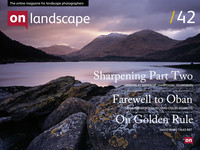Sharper Still!
In my second article on sharpening I’ll steer away from the theoretical and move onto the practical. Ignoring the ‘magic’ of deconvolution sharpening and the legacy of unsharp masking for a moment, lets have a think about what sharpening can actually do to make an image look sharper. Well, as you saw from the last article, the sharpening effects look for ‘edges’, either lines or spots/dots, and add a little bit of extra lightness on the light side of the more

Introduction to Sharpening
Quite a few readers have asked us about sharpening over the last few months. It’s such a big subject that it’s probably best to split up into a series of posts which means that this issue we have an introduction to blur and sharpening. The first step is to understand what blur is, where it comes from and what it looks like. Let’s take a look at two types of blur. Types of Blur The first type of blur is probably familiar more

Luminosity Masks
Luminosity masks allow us to target only the darkest areas of the image, perhaps warm shadows slightly or remove a cast from our highlights. more

Turbocharge your Photoshop
Landscape photographers - would you like to speed up your Photoshop processing of large files and save disc space? Watch Tim Parkin and learn how... more

Colour Correction with Curves
I’ve written quite a bit about using curves to adjust tonality and brightness but curves can be a lot more flexible tools than this more

Curves for Saturation and Contrast
We’ve talked previously about curves of various sorts and how to manipulate contrast and we also touched on the relationship between curves and saturation. more

Does Dark Matter?
It has come to my attention over the last few years that many landscape photographers have begun to shun a very good friend of mine – the black pixel. more

Balancing Light
Paul Moon’s article about the inclusion of areas of black in an image got me thinking about a pet peeve of mine - the balance of light in a picture. more

Inverting Colour Negatives in Photoshop
Have you used the in built profiles on the scanning software and got something substantially worse than the transparency film used previously? more

Introduction to Masks
In our second post processing instalment, we take a closer look at curves for contrast adjustments and targeted brightening and darkening of the image. more

Introduction to Curves
You must have come across curves, even Lightroom has a basic version of them. But what is it they do and how can we understand them and use them effectively more

Exposure Blending
One of our accepted goals as photographers is to ensure that our final ‘product’ is correctly exposed (we’ll come back to what ‘correctly exposed’ actually means later). Digital cameras can supposedly record 13 stops of dynamic range but real world tests show that although it’s possibly to detect differences at the 10th, 11th and 12th stops, they are swamped by noise. The real dynamic range of a good DSLR is about 8 or 9 stops. To put the that 8 more

Joe Cornish in Black and White
We thought it would be topical to take a look at some of Joe Cornish’s black and white photographs and this brought up a few nice surprises along the way. more

Introduction to Black and White photography
I’ve been asked by a couple of people to write some notes about black and white conversions and although I may not be the expert in this area, I thought it would be a good one to tackle and hopefully get some feedback from some people with more experience than me. 1) What to photograph 2) Preparing the file for conversion 3) Converting the colour file to black and white 4) Post processing Most articles and books I have read have spent the most more

Workflow for Digital Printing
As a percentage of images made, those which are actually printed is very small, more so with the advent of digital photo sharing on the web and especially for those who employ a machine-gun shutter firing philosophy. more

